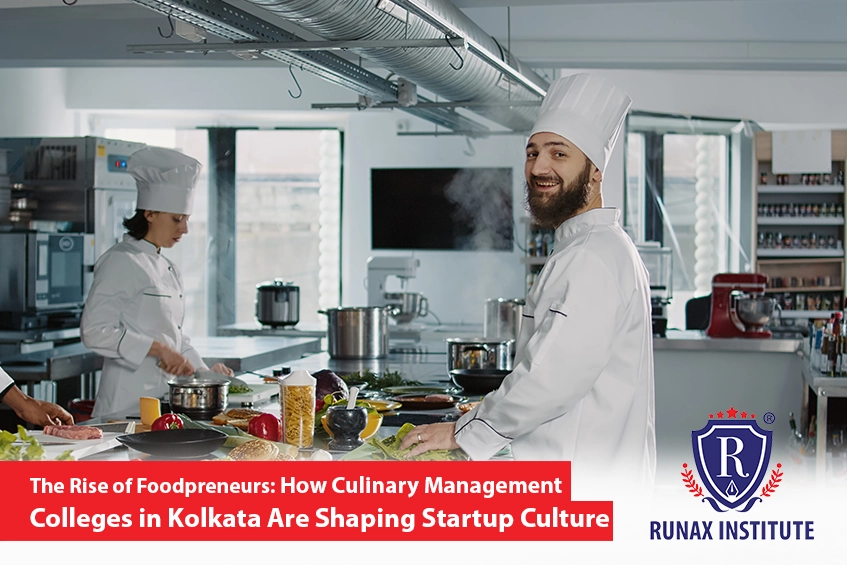Introduction
If you’ve ever dreamed of running your own café, launching a cloud kitchen or building a food brand that everyone raves about, you’ve probably hit a wall: you have the passion but maybe lack the formal roadmap.
The traditional route of “learn cooking, work in a hotel, maybe become a chef” no longer cuts it in a world where culinary skills and entrepreneurial smarts must go hand in hand. Without bridging that gap, many talent-rich food enthusiasts risk ending up stuck in kitchen jobs rather than leading vibrant food ventures.
In this article, you’ll discover how culinary management colleges in Kolkata are rewriting that script by turning chefs into founders—and you’ll learn how they infuse culinary entrepreneurship, food business management, and startup culture into education. Stick around to see how these institutes equip you with business acumen, digital marketing skills and real-world exposure so you don’t just cook—you launch, build and scale.
The Evolution from Chef to Entrepreneur in Modern Culinary Education
Gone are the days when the sole goal of a culinary student was to master recipes. Today, the industry demands more: business strategy, brand creation, menu innovation, and scalable models like cloud kitchen models.
In Kolkata, many institutions now blend classical culinary training with modules in food business management and restaurant startup ecosystem logic. Students still learn how to sauté like a pro, but they also learn how to draft a business plan, budget a food startup, negotiate with suppliers and pitch to investors. This shift means a student emerges not just as a chef but as a foodpreneur.
The infusion of entrepreneurial culinary education opens doors to launching cafés, experimenting with hybrid cuisine, designing dessert bars or turning an Instagram-worthy food truck into a regional chain. In essence, the best culinary programmes are producing entrepreneurs, not just kitchen operators.
Kolkata’s Culinary Ecosystem and the Entrepreneurial Shift
Kolkata has always had a rich food culture—from the street stalls to the upscale fine-dining. It now also sports a growing audience for gourmet cafés, experimental menus and delivery-first concepts.
That environment makes it fertile ground for students of culinary management colleges in Kolkata to tap into a culinary startup ecosystem ripe for innovation. Young foodpreneurs in the city experiment with local Bengali flavours reinterpreted for modern palates, delivery-centric models, and sustainable ventures like organic food and plant-based menus.
The city’s accessible market, coupled with growing entrepreneurship support, motivates students to go beyond the cooking bench. They pair food innovation labs with local flavour experiments, they test new models of chef-led enterprises, and they iterate quickly because the food audience in Kolkata is open, diverse and adventurous.
In short, the city offers the playground, and the colleges are the launchpad.
Entrepreneurship Modules in Culinary Management Colleges
What exactly happens in classrooms now? The curriculum has evolved. In programmes labelled “best culinary management course in Kolkata”, you’ll find modules on startup finance for food businesses, supply chain logistics for restaurants, digital branding for food brands, and even legal/regulatory basics for F&B ventures.
Colleges don’t just teach cooking—they teach how to run a business of cooking. They embed hospitality entrepreneurship into courses so students learn to target consumers, manage costs, draft marketing strategies, negotiate leasing and scale a concept. Incubation cells, mentorship programs, and tie-ups with food accelerator programs provide students with opportunities to pitch, prototype, and launch their ideas.
The result is a paradigm where students view their culinary education not as preparation for employment but as preparation for enterprise creation. The goal: graduates who create jobs rather than just take them.
Food Innovation Labs and Startup Incubation Initiatives
To translate theory into action, many institutions in Kolkata have set up food innovation labs and incubation programmes tailored for aspiring foodpreneurs. These spaces let students test ideas—like correlating menu design with local market behaviour, trying out sustainable packaging, or using analytics to optimise delivery performance.
Partnerships with food-tech companies and cloud kitchen models allow live-project experience: students might design a dessert concept, test delivery logistics, calculate cost per dish, iterate the model, then pitch for seed investment. These innovation labs blur the line between study and startup.
They teach students how to move from classroom models to market prototypes—where a “fancy café idea” becomes an MVP (minimum viable product) in the wild. The result is education that doesn’t end with graduation—it begins the entrepreneurial journey.
The Role of Technology and Digital Transformation in Culinary Startups
Any modern food business—not just big hotels—must live online, optimise for delivery, engage via social media and measure performance. That means education must include technology.
In Kolkata’s top programmes, students learn how to deploy food branding and marketing via Instagram, run inventory systems driven by analytics, integrate POS (Point of Sale) systems with delivery platforms, and apply food technology education to menu engineering and kitchen automation. They explore how a cloud kitchen model uses digital ordering, ghost brands, data-driven menu tweaks and delivery-only logistics.
Kitchen automation, feedback loops and intelligent supply chains become part of their training. The tech-savvy foodpreneur knows that creativity matters—but tech execution matters more. These colleges ensure you understand both the pinch of salt and the byte of data.
Industry Collaborations and Guest Lectures from Successful Foodpreneurs
Theory and tech are great—but nothing beats real-life stories. Colleges in Kolkata collaborate with successful restaurateurs and chefs turned entrepreneurs who share journeys, mistakes, pivots and triumphs.
Workshops led by gastronomy leaders highlight how they built brands from scratch, scaled with minimal capital, pivoted during crises and managed branding, scale and staff. Such collaborations teach not just cooking but also how to reposition a brand, choose a niche, navigate competition and attract investment.
The exposure helps students visualise their future not only as part of the workforce but also as part of the founding team. That changes mindset, motive and mission—turning students into future founders.
Challenges Faced by Emerging Foodpreneurs in India
No startup story is without hurdles. For foodpreneurs emerging from culinary management colleges, challenges include capital constraints, licensing and compliance issues, strong competition, high operating costs, and the rapid evolution of consumer preferences.
Education programmes are honest about this. They include modules on risk management, financial literacy, market strategy and operational optimisation. Students learn to build resilience, pivot when needed, minimise waste, optimise margins and design sustainable models.
They also explore how sustainable food startups demand eco-friendly sourcing, ethical operations and local-global positioning. With these contextual lessons, graduates are better prepared for the unpredictable, ambitious and exciting path of entrepreneurship.
Government Initiatives and Institutional Support for Culinary Startups
Entrepreneurship in the food sector is getting stronger support from government schemes, startup cell funding, and institutional incubation programmes. Colleges in Kolkata help students access resources like seed funds, coaching via entrepreneurship cells, subsidies for chef-led enterprises, and registration help for MSME or startup status.
Students are guided to tap into available schemes, pitch competitions and startup networks—so their food branding and marketing doesn’t begin from scratch. They learn how policy frameworks support the restaurant startup ecosystem, how to apply for loans, how to participate in government-backed accelerators and how to scale regionally.
This institutional backing gives aspiring foodpreneurs a structural launchpad as well as a creative one.
The Future of Culinary Entrepreneurship in India
Food entrepreneurship in India is at an inflexion point. Plant-based startups, gourmet delivery brands, regional cuisine pioneers and food-tech integration are the new normal.
Culinary management colleges in Kolkata are playing a key role in these shifts. Graduates of today will launch ventures that blend gastronomy, business, tech and sustainability. They’ll use data analytics, run hybrid physical-digital models, iterate concepts fast and scale regionally—thanks to training in entrepreneurial culinary education and exposure to culinary innovation in India.
The opportunities are huge, the market is growing, and the colleges are adapting. If you commit, you’re not just joining a course—you’re signing up for startup culture in food, where kitchen meets commerce, plates meet pitch decks, and taste meets tech.
Conclusion
To wrap it all up: if you’re serious about a food career that goes beyond “cook in a hotel”, you’ll want to choose a path that equips you for leadership, for business, and for innovation.
Culinary management colleges in Kolkata are doing just that—they’re shifting focus from cooking to launching, from skills to enterprise, from recipe books to business plans. They integrate food business management, cloud kitchen models, hospitality entrepreneurship, food technology education, and sustainable food startups into what was once a purely culinary curriculum.
The result? Graduates who are ready to be founders, innovators and brand builders. The college isn’t just your classroom—it’s your startup incubator. The era of the foodpreneur has arrived. Are you ready to cook, build and create?
Frequently Asked Questions
1. What makes the “best culinary management course in Kolkata” different from a regular cooking course?
The best courses combine cooking techniques with business training, including menu creation, brand building, startup strategy, delivery logistics, and entrepreneurship skills.
2. Can I start my own food venture right after graduating from such a programme?
Yes. Many programmes offer incubation support, mentorship, live projects and entrepreneur modules so you can launch your own café, delivery model or food brand.
3. How important is technology in modern culinary education?
Very important. These programmes train you in digital marketing, analytics, automation, POS systems, cloud-kitchen models and other tech skills critical for modern food-business success.
4. What challenges do foodpreneurs face, and how do these colleges help prepare them for them?
Challenges include funding, licensing, market competition, scaling and sustainability. Colleges prepare you via modules on financial literacy, risk mitigation, sustainable practices and operational efficiency.
5. Why choose Kolkata for such a course?
Kolkata offers a rich food culture, affordable education, a growing café-and-startup scene, and colleges actively blending culinary arts with entrepreneurship training tailored to the food-business ecosystem.






